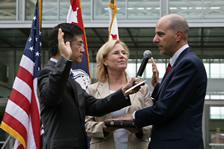

USPTO's most recent head and software patents apologist, IBM's David Kappos
Patent trolls are a major source of harm, but they are not the principal source, never mind what the White House is trying to tell us [1, 2, 3]. The corporations-leaning USPTO, with its ludicrous monopolies on algorithms constantly and endlessly (without boundaries) being granted to companies large and small, is the real problem. According to this post, even dining businesses are seriously affected by USPTO stupidity, To quote: "Innovative Wireless Solutions LLC, a non-practicing entity [....] filed 40+ lawsuits in the Eastern District of Texas against a variety of hotels, hotel chains, and restaurants/coffee shops/delis" (over patents).
Former Sen. John E. Sununu has an op-ed in the Boston Globe today that perfectly encapsulates the talking points of those who oppose efforts to clamp down on patent trolls.
[...]
Of course, former Sen. Sununu said that, although to be fair he was talking about banks, not inventors.
But this isn’t about pointing out hypocrisy. It’s about examining incentives. What kind of incentive is it if a person can make a fortune simply by getting a patent, instead of having to develop the patent into a business? We won’t get more innovation; we’ll just get more patents and more lawsuits, which is exactly what’s happened.
As the Obama Administration’s recent study showed, for every dollar a patent troll makes, the defendants who paid them lose ten dollars. That’s a net loss to the economy. Clearly, the incentives are wrong. We should be incentivizing entrepreneurship, not patent lottery tickets.
A surprisingly small number of innovative firms use the patent system. In the UK, the share of firms patenting among those reporting that they have innovated is about 4%. Survey data from the same firms support the idea that they do not consider patents or other forms of registered IP as important as informal IP for protecting inventions. We show that there are a number of explanations for these findings: most firms are SMEs, many innovations are new to the firm, but not to the market, and many sectors are not patent active. We find evidence pointing to a positive association between patenting and innovative performance measured as turnover due to innovation, but not between patenting and subsequent employment growth. The analysis relies on a new integrated dataset for the UK that combines a range of data sources into a panel at the enterprise level.
Experts suggested that patent litigators based in England could be the counsel of choice for many Unified Patent Court (UPC) plaintiffs at a debate on litigation finance held in London last week.
Panellists at the discussion, held at the offices of litigation finance and insurance broker The Judge, suggested that recent civil litigation costs reforms in the United Kingdom and the increasing sophistication of the country’s litigation funding market could make the services of British practitioners especially attractive to patent owners seeking to assert their rights in the UPC.
Once established, the UPC will cover at least 13 countries, including France, Germany and the United Kingdom; at most it could hold jurisdiction over all 25 signatory states, with the prospect that Poland and Spain – which have opted out of the UPC for the time being – and any future European Union members could come on board at a later stage. “Either way you look at [the UPC jurisdiction], it will at least be comparable to the United States in terms of GDP and population,” said panellist Alan Johnson, partner at Bristows. “Around about 600,000 patents will suddenly be able to be litigated on a pan-European basis. In addition to a wider injunction being available, higher damages will also be possible. Almost as certainly as night follows day, you can see a group of patentees thinking right now about where they can enforce [in the UPC].”
The long-running patent battle between Versata and SAP saw a lot of action this week. Back in 2007, Versata filed a lawsuit claiming SAP infringed a patent on a method “for pricing products in multi-level product and organizational groups.” This dispute – which raises important issues about patents and software – is proceeding both in the courts and at the Patent Office. Yesterday, EFF joined an amicus brief supporting SAP at the Federal Circuit, where SAP is arguing that it does not infringe. Meanwhile, at the Patent Office, SAP won a landmark ruling finding that the invention was not patentable because it merely covers an abstract idea.